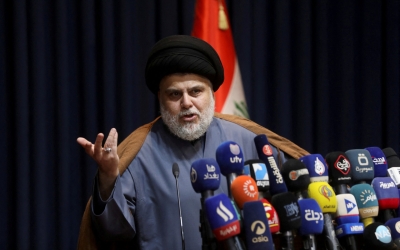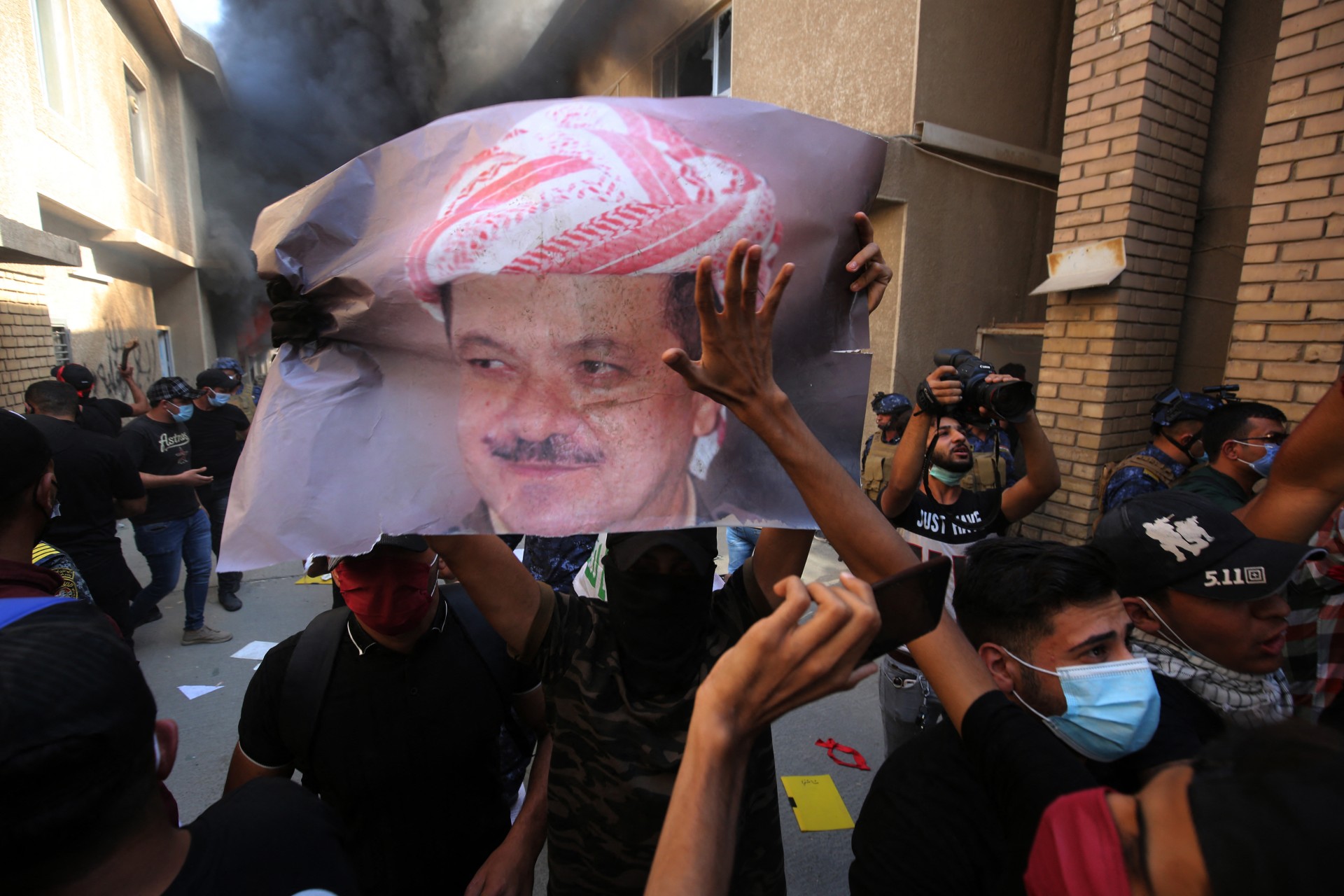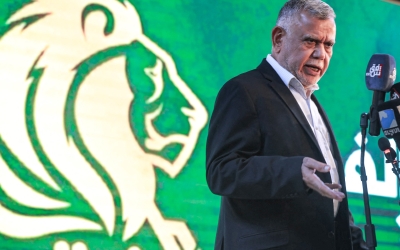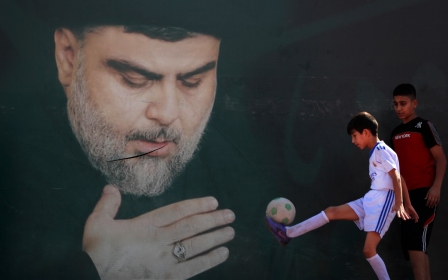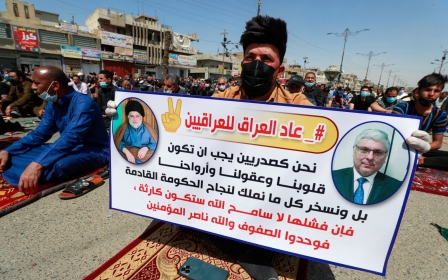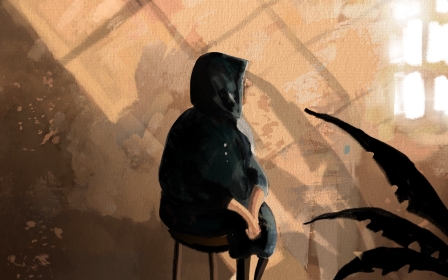Iran piles pressure on Iraq's Kurdish and Sunni leaders to crack Sadr's alliance
Iran has begun piling pressure on Kurdish leader Massoud Barzani and the speaker of Iraq's parliament, Mohammed al-Halbousi, hoping to convince them to abandon Muqtada al-Sadr's political project and save Tehran's Iraqi allies.
Six months on from Iraq's October elections, and neither Sadr's Save the Homeland alliance nor the Iran-backed Shia Coordination Framework, led by former prime minister Nouri al-Maliki, has been able to form a government.
Sadr is currently taking a political timeout. The influential Shia cleric had sought to exclude his rivals by forming a majority government alongside Barzani's KDP and the Sunni Sovereignty bloc, led by Halbousi.
'Sadr is stubborn and reckless. He does not mind pushing matters to the brink if the Iranians intervene directly, unlike his Kurdish and Sunni allies'
- pro-Iran Shia leader
But abstaining Coordination Framework MPs have choked all progress in parliament, prompting Sadr on 30 March to withdraw from politics for 40 days and set his rivals a deadline to form a coalition of their own.
With two weeks to go, Iran believes Sadr's "tactical" retreat has given its allies an "irreplaceable" opportunity to dismantle his alliance, Iraqi politicians and observers told MEE.
New MEE newsletter: Jerusalem Dispatch
Sign up to get the latest insights and analysis on Israel-Palestine, alongside Turkey Unpacked and other MEE newsletters
Pressure has been intensified on Sadr's "soft flanks": Barzani's KDP and the Sunni factions headed by Halbousi.
The Iranians and their Iraqi allies are trying to isolate Sadr and force him to change his position, paving the way for an agreement that would see a government formed that included all prominent parties, Iraqi politicians familiar with the progress of negotiations told MEE.
"Sadr is stubborn and reckless. He does not mind pushing matters to the brink if the Iranians intervene directly, unlike his Kurdish and Sunni allies," a prominent Shia leader close to Iran told MEE.
"Therefore, the Iranians chose to play with him in an indirect way. Doubling the pressure on Barzani and Halbousi is more effective and less harmful than pressuring Sadr."
Pressuring Sadr's allies
Since the 2003 US-led invasion, Iran has been the dominant power in Iraq. But in October its local allies, including the forces that make up the Coordination Framework and the Patriotic Union of Kurdistan (PUK), the second-largest Kurdish party, suffered humiliating losses.
Iraqi politicians told MEE that Iran is now seeking to offset these losses and maintain its influence, and stopping Sadr's tripartite coalition from taking power is now a "priority".
According to the Shia leader, the Iranians believe that as long as some of the parties within the Coordination Framework are represented in the government, they will be satisfied.
Addressing a row between the KDP and PUK over who will take the presidency is also seen by Iran as key to ending the political impasse, he added.
However, Iran's local allies believe that this is not enough. Iraqi politicians said the Coordination Framework believes pressure can be placed on Sadr's allies to ensure that all the Shia alliance's parties are included.
Betting on Barzani
Iran tends to pressure parties in Iraq using a combination of intimidation and enticement. Barzani and Halbousi are no exception.
US and Iraqi officials told MEE they did not know precisely what offer Iran was giving Barzani, but predicted Tehran could use a number of tools.
Iraq's semi-autonomous Kurdistan region, which is ruled by Barzani's KDP, borders Iran and is in range of Iranian missiles. An Iranian rocket salvo targeted Erbil in March.
Meanwhile, officials noted that the Kurdish government smuggles oil, goods and money via Iran – revenue that Tehran could easily turn off.
"Iran is using a carrot-and-stick policy with its opponents and allies alike," said Elie Abouaoun of the US Institute of Peace.
"Barzani and the rest of the Kurdish leaders will not escape this policy."
According to the US and Iraqi officials, Iran can offer Barzani several temptations. It can tell its allied Iraqi armed factions to ease pressure; help the KDP obtain more senior governmental positions; back Erbil in its spat with Baghdad over oil revenue; and turn a blind eye to smuggling operations through Iranian territory.
'The Iranians will be generous with Barzani. They will not pay anything out of their pocket. Whatever they promise, the Iraqis will pay'
- Elie Abouaoun, US Institute of Peace
"The Iranians will be generous with Barzani. They will not pay anything out of their pocket. Whatever they promise, the Iraqis will pay," Abouaoun said.
Three KDP leaders refused to divulge to MEE any details about offers made by Iran, but did not deny increasing Iranian pressure in recent weeks. The Erbil missile attack and a Federal Court decision that ruled Iraqi Kurdish independent oil sales illegal were cited as evidence.
"We have received our share of Iranian pressure in advance. Is there more pressure than the ballistic missile attack and the passing of a law stripping the regional government of its right to dispose of the region's oil?" a KDP leader close to Barzani told MEE.
"The Iranians are patient. They have played the security card and the Federal Court, but they still have more cards," the KDP leader.
"What they care about is that Sadr does not tilt the balance his way, and that things do not go the way he wants. So far, there is no change in our position, but if [Sadr] chooses to go to the opposition, the situation will change."
Halbousi's rivals
Pressuring Halbousi is a different story
The parliament speaker is currently the most influential Sunni politician, uniting most Sunni parties and politicians under his umbrella.
Iran appears to have adopted a strategy of undermining Halbousi's control of the Sunni arena and backing rival political and tribal leaders who can challenge his authority, Sunni politicians and observers told MEE.
Last week saw the sudden return of former finance minister Rafe' al-Issawi, who was once one of the most prominent Sunni politicians but has been in self-imposed exile for a decade after being convicted of terrorism and corruption charges.
'Whatever the type and size of pressure, the Sovereignty Alliance cannot leave Sadr now. This would be our end'
- Sunni political leader
An Iraqi court specialised in terrorism cases had unexpectedly overturned the conviction, citing "lack of evidence".
A few days later, Ali Hatem al-Suleiman, one of the most prominent Sunni tribal leaders, also returned to Baghdad after charges of "supporting terrorism" and "incitement against the Iraqi security forces" suddenly vanished.
Issawi and Suleiman both wield wide influence in Anbar governorate, Halbousi's birthplace and stronghold.
They are considered two of his fiercest opponents, and their supporters accuse Halbousi of obstructing their return to normal life.
Sunni politicians close to Halbousi told MEE that the recent court decisions quashing cases against Issawi and Suleiman are considered part of Iran's attempts to undermine the speaker's hegemony over the Sunni political scene.
Their reintroduction, presented as alternative Sunni leaders, is a direct threat to Halbousi, the sources said. Halbousi himself is currently in Tehran for talks.
"The goal of bringing back such figures is clear. The Sovereignty Alliance and Halbousi are the target," one of the coalition's leaders told MEE.
"Whatever the type and size of pressure, the Sovereignty Alliance cannot leave Sadr now. This would be our end. Our compass can be changed if Sadr decides to go to the opposition. Only then can we ally with the Coordination Framework."
Sadr steps in
Aware of the pressure placed on his allies, a few days ago Sadr invited Coordination Framework leader Hadi al-Amiri and Faleh al-Fayyad, head of the Popular Mobilisation paramilitary force, to meet him in al-Hanana, his residence in Najaf, Shia politicians familiar with the latest developments told MEE.
Sadr offered a new proposal, with three options.
The first requires half of the Coordination Framework's MPs to join Sadr's coalition, excluding Maliki's State of Law party.
The second would see Maliki's MPs join him, but the other half of Coordination Framework lawmakers excluded.
The third would have Sadr go into opposition and leave the government formation to his rivals.
The Coordination Framework has not officially responded to Sadr's latest offer.
Although some Shia political leaders have suggested that the leaders of the Coordination Framework would accept dividing the alliance and joining Sadr, two of the alliance's leaders told MEE that the proposal has been turned down.
"The offer has been rejected," a State of Law leader close to Maliki told MEE, saying it was not possible to divide the Coordination Framework’s forces.
"There is a moral obligation between us, and it cannot be breached by accepting Sadr's offer. As for the third option, this is also not acceptable. The presence of the Sadrists in the opposition means that no government will last for more than six months or a year, as a maximum," he said.
"We have no choice but to dismantle the tripartite alliance and return Sadr to the Shia embrace."
Middle East Eye delivers independent and unrivalled coverage and analysis of the Middle East, North Africa and beyond. To learn more about republishing this content and the associated fees, please fill out this form. More about MEE can be found here.


